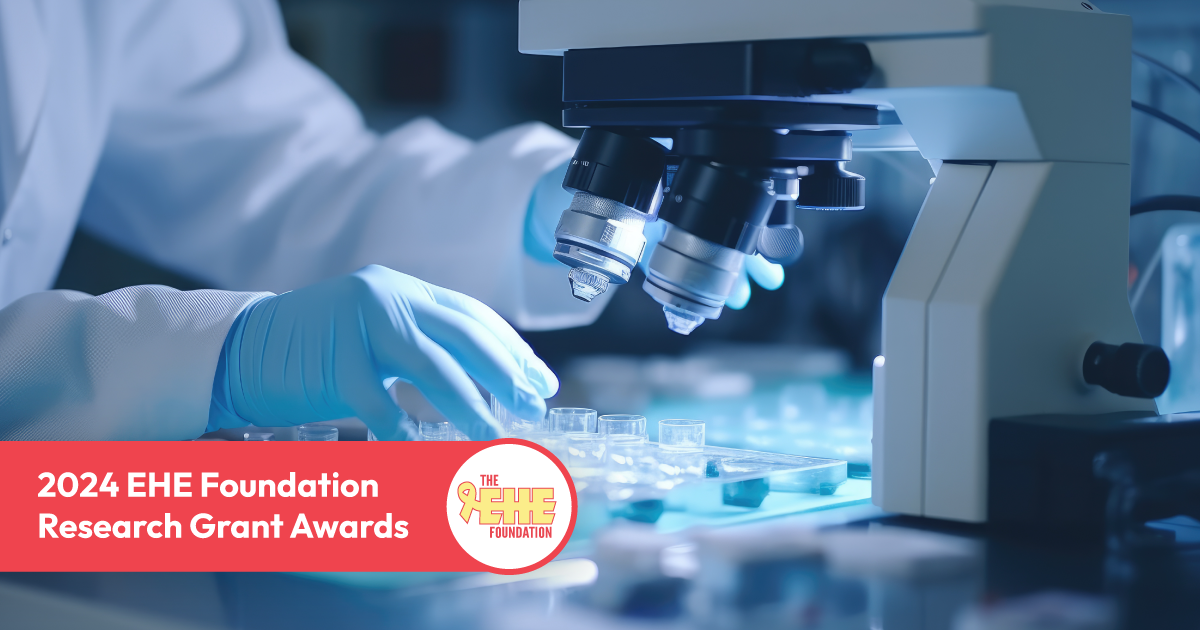We are pleased to announce The EHE Foundation’s 2024 Research Grants Program awards, totaling $307,400, as part of our ongoing commitment to advance our mission to find effective treatments and a cure for EHE. Made possible by 2023 Giving Tuesday gifts, these grants support novel translational research projects that aim to identify and accelerate the development of potential therapies for EHE.
With the guidance of our dedicated Research Committee, Scientific and Medical Advisory Board, and invited expert reviewers, we are pleased to announce the research grants awarded in 2024:
Evaluation of druggable targets for the treatment of aggressive metastatic EHE
Ajay Pobbati, PhD | Cleveland Clinic Foundation
Project Summary:
Patients with aggressive epithelioid hemangioendothelioma (EHE), especially those whose cancer has spread, do not have effective treatment options. This project focuses on finding drugs that could slow or stop the spread of aggressive EHE.
This research builds on significant efforts by this lab to identify drugs that can reduce the disease burden of EHE. The scientists have previously reported their discovery of a protein called Cdk9, important for the stability of TAZ-CAMTA1 (TC), a fusion protein that causes EHE. In this expansion project, Cdk9 inhibitors, including those already FDA-approved, will be evaluated and prioritized based on their ability to destabilize TC. The top Cdk9i candidates will be evaluated in vitro and in vivo, to identify a drug most suitable for a clinical trial of patients with aggressive, metastatic EHE.
Ultimately, this project aims to find a drug that can improve patient outcomes by repurposing a drug that can reduce EHE metastasis.
Combination therapy targeting genomic and signal transduction vulnerabilities in epithelioid hemangioendothelioma
Gillian DeWane, PhD | University of Iowa Carver College of Medicine
Project Summary:
EHE is caused by specific fusion proteins: TAZ-CAMTA1 and YAP-TFE3. These fusion proteins bypass regulation by the Hippo pathway and act as important transcriptional coactivators by activating a TEAD-based transcriptional program responsible for activating genes in several downstream pathways, including the PI3K pathway. Using cells engineered to express the YAP-TFE3 fusion protein, this lab has identified topoisomerase II as a therapeutic vulnerability in EHE and has further found that it is a key transcriptional cofactor for the TAZ-CAMTA1 and YAP-TFE3 fusion proteins.
This translational science project will investigate low concentrations of topoisomerase II inhibitors to enhance combination therapy targeting the PI3K-Akt axis and TEAD binding of the TAZ-CAMTA1 and YAP-TFE3 transcription factors.
Significant for people with aggressive EHE, this project could identify a combination treatment approach for further investigation in people with EHE.
Characterizing cell-penetrating peptide entry into EHE
Tohru Yamada, PhD | University of Illinois at Chicago
Project Summary:
The most common genetic signature for approximately 90% of all EHE cases is a WWTR1(TAZ)-CAMTA1 gene fusion. In about 50% of these, a secondary loss of tumor suppressor CDKN2A activity is associated with more aggressive disease. The CDKN2A gene encodes two important tumor suppressors, the CDK4/6 inhibitor p16ink4a and p14arf which activates p53. Therefore, mutation of CDKN2A activates tumor cell growth in part by inhibiting p53 activity, an important protein that normally stops tumors from growing. Therefore, reactivating p53 in EHE cells with CDKN2A mutation could reduce tumor cell proliferation and present an excellent opportunity for clinical intervention.
This project aims to investigate if a safe cell-penetrating peptide, p28, which is preferentially taken up by many cancer cells, can stabilize p53 in EHE cells with CDKN2A mutation. The scientists hypothesize this should reduce the growth potential of these more aggressive EHE cells.
Importantly for patients, this early-stage translational science provides a novel strategy to attack EHE and could lead to new treatments that improve outcomes for people living with EHE.
The EHE Foundation thanks the donors who generously give to fund impactful EHE research, our dedicated Research Committee, the Scientific and Medical Advisory Board, and invited expert reviewers for their time, as well as EHE patients and families whose participation makes this and other research possible.

